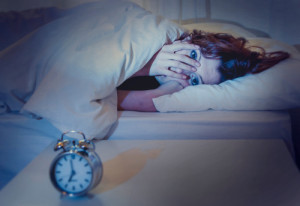Too Anxious to Sleep?

“Anxiety and stress have always had an impact on our sleep quality, but now we see that not only do everyday stressors like finances or family keep people awake, but the stress associated with falling back asleep, as well,” explains Rochelle Goldberg, MD, director of sleep medicine services at the Paoli Hospital Center for Sleep Medicine.
You might be able to relate if a few minutes of interrupted sleep have left you lying in bed, trying to “beat the clock” and fall back asleep before the alarm goes off or obsessing over the minutes or hours you’ve been awake. This anxiety can send your brain into overdrive, making it harder for you to fall back to sleep, and causing you to lose precious hours of shut-eye.
Although this issue is more common in patients who have been diagnosed with anxiety disorders, it can happen to anyone.
“You don’t have to have general anxiety for your mind to be racing at night,” says Dr. Goldberg. “It does increase your risk, but worrying can still disrupt your sleep even if you’re not an anxious person.”
So, what can you do? Dr. Goldberg says that although there are no specific treatments for ‘sleep anxiety’ there are a few at-home remedies to reduce your risk. If you find your mind racing at night with thoughts of an upcoming project at work or a family conflict, keep a notepad by your bed to write your thoughts out and reflect on them or act on them in the morning. Getting them written out on a piece of paper should help you feel that you’re doing something to address them.
In addition, avoid caffeine and alcohol for at least four hours before bed. Although many people claim alcohol helps them sleep better, chances are it will help you fall asleep, but not stay asleep. Try green tea, flavored sparkling water, or another beverage instead.
Other behavioral measures that are helpful include setting aside time during the day specifically for thinking and worrying. Choose a time when you are usually free and have time to think through problems, and try to do it somewhere other than your bedroom. Relaxing before bed is also important to get the mind and body ready for sleep. Avoid the computer as the light from the screen may send a signal to your brain to wake up.
“Reserving your bedroom specifically for sleep can help your mind to adjust to the fact that, when you’re in there, it’s time to rest. Your bed is for sleep, so if you are not asleep or likely to fall asleep, it’s not where you should be,” says Dr. Goldberg.
If stressful thoughts or anxiety are keeping you up at night and at-home remedies won’t solve the problem, make an appointment with a sleep medicine specialist.
 Content you want, delivered to your inbox
Content you want, delivered to your inbox
Want to get the latest health and wellness articles delivered right to your inbox?
Subscribe to the Well Ahead Newsletter.
